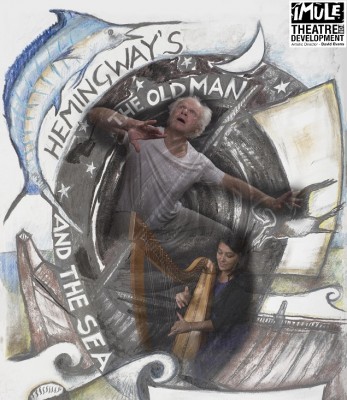
The Old Man and the Sea is Ernest Hemingway’s 1952 Pulitzer Prize winning novella which recounts a fisherman’s battle with a huge marlin and the affinity he develops towards the big fish over the 3-day encounter. The despair and the fear, the loss and resignation; a chronicle about the indomitable spirit of man.
Imúlé Theatre describes this show as a story-telling experience. Actor David Evans gives a gentle but energetic performance; key passages are partially improvised to reproduce the reader’s experience of unrelenting uncertainty. The aim is to recreate the power and immediacy of Hemingway’s fable. He is supported by the stirring harp playing and singing of Anna Tanvir.
The stage is simply lit with white light and the set is sparingly strewn with fabrics, nets and pots to give us the maritime feel. A single chair serves as the only prop. The story unfolds on the coast of Cuba; an old fisherman, Santiago, down on his luck and his faithful young friend Manolin. They talk of baseball and Africa. We see the tenderness of their relationship in David’s sensitive performance, a soft voice, a smirk and a smile. Like the sole actor on the stage we know the old man as an isolated figure with only his devoted young friend to help him. He decides to row his boat alone, far out from the coast in an attempt to break his streak of bad luck and land a big fish.
Interspersing the action with songs, the two performers sing in different languages; their harmonies work well. And as the action intensifies in the second half Anna’s harp provides a surprisingly positive and dynamic backing-track to the events, which grow in vigour.
While he is fishing, Santiago describes his feelings about the creatures of the sea; Dorado, flying-fish and turtles. Finally, he hooks the giant fish and we live through his struggle to land the beast and return home. When the action intensifies, we see and feel the pain and strain in David’s hands and arms as he grapples with the imaginary fishing line; at one point writhing on the floor, like the fish itself.
This is a tale which speaks of the universal truths of a person’s existence within this world; where pride, respect and tenacity incite a man in the face of adversity. The theme is still as current as ever but what about women’s virtues? Hemingway never had a lot to say about women, often pushing them to the side-lines… like the picture of Santiago’s wife which sits on a shelf in this tale. But by combining the dialogue with singing and harp, Imúlé Theatre has found a way to add some femininity and softness to this performance – a contrast which both complements and enhances the raw masculinity of the story. ★★★☆☆ Adrian Mantle 1st February 2017

